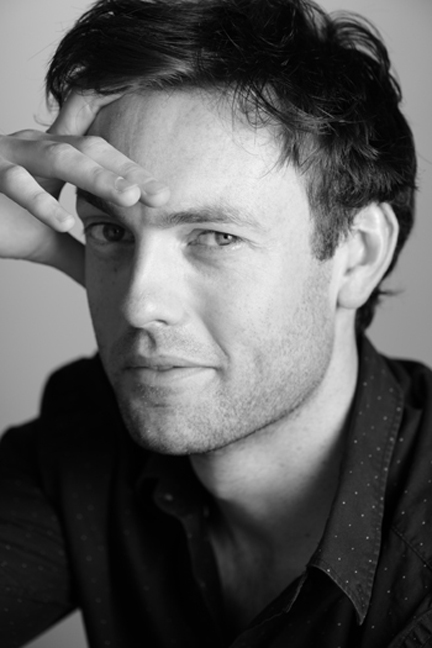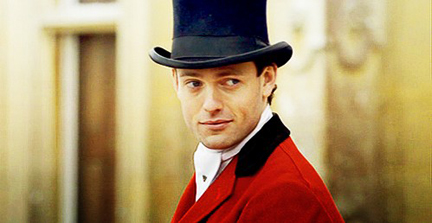You probably recognize him as Evelyn Napier in Downton Abbey or as the Thursday brothers in the “Crimson Horror” episode of Doctor Who. But… did you know Brendan Patricks is also, quite literally, a magician?
(photo by Sasha Gusov)
Brendan was kind enough to do an email interview with me to share the story of his career and a bit about his process. I’m fascinated with magicians, so although it was spotting him in two of my favorite TV shows that initially piqued my interest, I was instantly intrigued when I found out he practices slight of hand. The mystery of things, like in science fiction, is held somehow for us to experience in magic, and it seems to add vitality to the creative process in general to be able to infuse a little sense of the unknown. What’s it like for a magician when someone welcomes and enjoys the mystery?
“When people really buy into it, it’s great,” Brendan said. “I use to watch David Blaine at school before I knew any tricks and I thought he must have some connection to the Devil. That’s a powerful thing to achieve as a performer. Great actors hundreds of years ago were buried at a crossroads with a stake through their heart – what an awesome compliment. You’re really aiming for the audience to interpret what you’re doing in their own powerful way and where better for that to happen than in their imaginations.”
Speaking of imaginations, I asked him what advice he would offer someone who wants to be more creative. “Start making stuff up in you head and enjoying doing that. There is a wonderful joy in coming up with a great story in your head.”
In other words, forget what they told you in school about how you shouldn’t be looking out the window and daydreaming! Do it!
“Even if you never write that story down, the process of coming up with it has changed you, reinforced or destroyed your opinions on life. Try not to worry about being more creative — just create stuff, even if you never show it to anyone. You’ll build up this strange archive of past creative ideas, which you can draw from in the future. Sometimes you won’t even know you’re using it.”
So, having fun isn’t merely a bonus to doing work he loves, it’s actually a big part of his process.
“It’s everything,” Brendan emphasized. “I used to take myself very seriously as an actor but there’s a limit to how far you can go with a part unless you’re messing around with stuff and constantly having fun. It’s fun to play someone who isn’t you, even if that character is having a bad time.”
Often, I find that people feel skeptical of the points in the creative process that feel messy and disorganized. People who aren’t creatives for a living per se, or who are endeavoring to try a new arena, grapple with the feelings of vulnerability of not knowing what one’s doing.
When I asked Brendan what the messiest part of his process was, he replied, “I think it’s all pretty messy.” He described the process as being sort of cobbled together, and “hoping that whomever looks at it doesn’t see the seams.”
I thought it very brave to be willing to put anything out there for the world to see that you yourself perceive has barely held together. Isn’t that what we admire when we see it up on stage? The seemingly benign act of someone putting something out there. And, yet knowing that the bravery we are witnessing must then be supported by practices (stake-through-the-heart-worthy black magic?) that enable the actor to escape what we ourselves would fear to do.
(photo credit: Downton Abbey/PBS)
Brendan’s black magic is simple: “Never compare yourself to other artists. This is hard, so it’s important to remember that it’s your journey and that it can never belong to anyone else. If you can negate the idea of career success or failure, you’re suddenly striving to make your work interesting for you and engaging for whoever is viewing it, rather than constantly competing with other humans.”
“I’m also a great believer in chance,” he told me.
My own experience has lead me to ponder the role chance plays in the creative process and in one’s career over time. Diligence, hard work, and dedication seem to work to a point — I make sure to practice writing every, single day, which ensures the muse’s appearance more regularly. However, attempts at total control, not just in creativity, but in life at large, are generally pretty futile.
“Embracing chance has made me much more comfortable. It doesn’t mean you can’t get better at something like acting or magic or carpentry but enormous success and wealth because of those skills is really down to chance. And if that is the case then why worry about something that you cannot control – just enjoy whatever you want to get better at.”
If you think that sounds hard to do without an extreme ability to be present, consider a statistical example:
“In Massimo Piatelli-Palmarini’s Inevitable Illusions he says that if you tossed a coin a hundred times, we’d naturally expect about 50 heads to come up and 50 tails,” Brendan explained. “But actually this is only true for hundreds of thousands or even millions of coin tosses. In fact, if you toss a coin a hundred times, it’s just as likely to come up all tails, as it is half and half. If you take that image of the coin and change it to a person’s life, chance really affects everything. We assign reason to things that happen in our lives when really it’s just chance.”
Another interesting aspect of Brendan’s career is the fact that he essentially has two professions. Rather than finding one to be a hindrance to the other, his experience has been quite the opposite.
“If I hadn’t had Magic, I don’t think I’d be able to be an actor. Acting is very much swings and roundabout – one minute you’re working for three weeks and the next nobody seems to want you for six months. Drama schools never really prepare actors for the reality of being out of work. I’ve always thought that they could just put in a couple of hours of week where you learn to be a carpenter or a plumber or a magician so that when you get out in the real world you’ve got something that you can do, that you control and is flexible enough for you to still audition.”
What has given him an edge in his craft as an actor can actually be attributed to his pursuit of magic, as well: “I’m very lucky that I can learn lines incredibly fast and with ease. I wasn’t always able to do this — once a director threw a script at my head. Then I got into magic and was learning long card routines all day long from old, dusty books.”
Here’s a little sample of Brendan’s on-camera magic from an O2 commercial:
“When I did the O2 commercial, I worked with a magician called Dynamo, who is now a big star in the UK, and we spent a week coming up with various methods for doing what it looked like in the end.”
But what I wanted to know was, did he perform these tricks the same way he would live, or were there camera tricks involved?
“I’m confident I could replicate live what you see on the commercial given enough time to practice but that’s really all I can tell you.”
Fair enough. I prefer to not know the “trick,” anyway. But I did ask him how he engages with the people he’s performing for.
“To create drama within a magic performance, you don’t want to hold yourself above an audience. You’ve got to be a flawed human being struggling to achieve something in front of their eyes. That’s how you hook ‘em.”
Brendan sort of always had it in him to become an actor and a magician, even though it took some time for him to see it clearly.
“Acting was always something I wanted to do from an early age but my parents didn’t really approve of the idea. I toyed with becoming a barrister for a while to appease my Mum. When I was growing up, I loved magic and would have loved to learn it but it seemed like a completely closed shop. The closest I came was when I was 11 at school. I was in a kind of Victorian music hall show where I was the magician. I had an assistant and we kept coming on stage too early and then when we were finally introduced, we were at the back of the hall with suitcases pretending to go home.”
Unlike the phase some 10-year-old boys go through of getting hooked on card tricks and attending Magic Camp, Brendan didn’t really pursue it until he was in his 20s.
“Getting attached to magic only happened when I was 21. My father had always been terrible at buying Christmas presents, sometimes giving my Mum bin bags wrapped up with an amusing note. This normally resulted in upset each Christmas until one year, he’d obviously discovered mail order and we all had these great presents. One of which was a little magic book with a handful of card tricks in it. My Dad was diagnosed with Alzheimer’s a few years later and looking back on that Christmas day, I’ve always thought that he knew something was up with him and it was his way of saying goodbye. I didn’t look at the book for a few months but once I did, I became obsessed. I would practice stuff all day and I saved up for other books or found secrets on the Internet.“
And, despite growing into a sought-after magical performer in London, it took awhile for him to get his legs under him. But it didn’t stop him from getting himself out there. “I met my first Magicians at a little club just off Trafalgar square a couple of years later. They were so much better than me to the point where I felt embarrassed to be hanging out with them.”
“My second acting job took me to India for 10 weeks and we were in the middle of nowhere. I practiced sleight of hand all day; everyday and found I had a knack for it. When I got back to London, I’d got to a point where I could hold my own among Magicians who been doing it since they were little.“
Call that chance, or call it the cross-pollination with his acting career. Either way, Brendan’s a terrific example of the value of being flexible to the creative process, and in navigating a creative career in the long-term. He recently starred in the romantic comedy My Last Five Girlfriends, and is now wrapping up filming a new part in a tv series called Mr. Sloane. I asked him what new challenge he might be dreaming up next.
“I just don’t know. Every part is a new challenge and opportunity. I think half the fun is not planning what kind of parts you want to play. It means that when you get the next script, you’re approaching it with completely fresh eyes rather than a thought out plan.”





